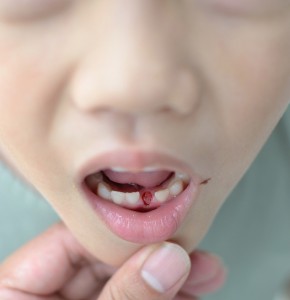 You can help your child prevent oral injuries by closely supervising him or her during play and not allowing the child to put foreign objects in the mouth.
You can help your child prevent oral injuries by closely supervising him or her during play and not allowing the child to put foreign objects in the mouth.
For younger children involved in physical activities and sports, mouth guards are strongly encouraged and can prevent a whole host of injuries to the teeth, gums, lips, and other oral structures. Mouth guards are generally small plastic appliances that safely fit around your child’s teeth. Many mouth guards are soft and pliable when opened and mold to the child’s teeth when first inserted.
If the tooth has been knocked out, try to place the tooth back in its socket while waiting to see our office. Remember to hold the dislocated tooth by the crown – not the root. If you cannot relocate the tooth, place it in a container of cold milk, saline, or the victim’s own saliva. Place the tooth in the solution.
First, rinse the mouth of any blood or other debris and place a cold cloth or compress on the cheek near the injury. This will keep down swelling.
For a fractured tooth, it is best to rinse with warm water and again, apply a cold pack or compress. Ibuprofen may be used to help keep down swelling.
If the tooth fracture is minor, the tooth can be sanded or, if necessary, restored by the dentist if the pulp is not severely damaged.
If a child’s primary tooth has been loosened by an injury or an emerging permanent tooth, try getting the child to gently bite down on an apple or piece of caramel; in some cases, the tooth will easily separate from the gum.
Irritation caused by retainers or braces can sometimes be relieved by placing a tiny piece of cotton or gauze on the tip of the wire or other protruding object. If an injury occurs from a piece of the retainer or braces lodging into a soft tissue, contact our office immediately and avoid dislodging it yourself.
If you experience these or other accidental tooth injuries, please contact us at Scott M. Healey Dentistry for dental emergency care in Lindon, Utah.















